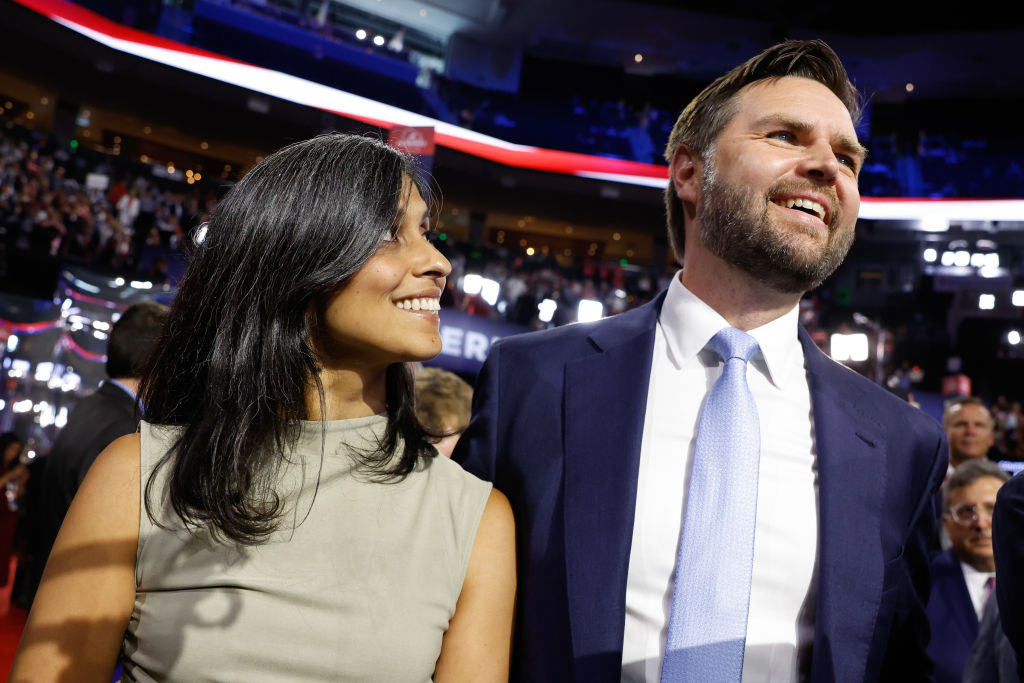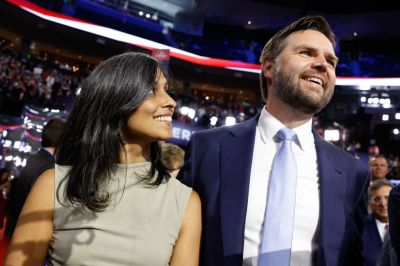There are lots of ways to think about vice presidential nominations, but typically they fall into one of two categories: The future and the past.
The traditional role of a running mate is mostly directed toward the presidential candidate’s own party. That’s usually as a consolation prize to soothe and unite the coalition, and a promise that other factions will have a seat at the table.
But not always.
Ohio Sen. J.D. Vance’s elevation as the 2024 Republican vice presidential nominee is most assuredly not about consoling.
Vance is no balm for Republicans worried about Trump’s positions on foreign policy, international trade, and industrial policy, having singled out Lina Khan, the business-bashing chairwoman of the Federal Trade Commission for praise and developed a high-profile partnership with Massachusetts Sen. Elizabeth Warren to try to increase financial regulations. A guy who lambastes “Wall Street Journal conservatism” seems unlikely to reassure economic conservatives.
And that’s kind of the point. Vance, who turns 40 next month, has worked hard to make himself a leader of the mad-as-hell men of early middle age in the GOP who have equal scorn for the woke left as they do old-fashioned Republicans, whom Vance has excelled at trashing. His attacks on Nikki Haley, the self-styled Reaganite choice in this year’s primaries, were intense even by stump-speech standards.
In Vance, Donald Trump has chosen a running mate not to unite Republicans, but one who sends the clearest message possible that the old GOP is not welcome in his party.
If the conventional wisdom is right and Trump is bound for a decisive win this fall, the choice of Vance may be a defining one for American politics for a generation to come.
Trump touted Vance’s ability to win votes from “American workers and farmers in Pennsylvania, Michigan, Wisconsin, Ohio, Minnesota, and far beyond,” but it's hard to imagine how any such workers and farmers who might be susceptible to Vance’s charms aren’t already Trump supporters.
The former president won white voters without college degrees by 32 points in 2020, so it’s unlikely there is much more room for growth there. Vance is most famous for the book and movie Hillbilly Elegy, which is about the plight of people in Appalachia who are already among the most intense Trump supporters in the nation.
It’s not that there wouldn’t be any voters who might be won over by Vance, but it just seems implausible that turning up the intensity in Trump’s base, which is already ecstatic in its fervor, could offset the cost from Vance on the other side of the ledger. An abortion hardliner who says then-Vice President Mike Pence should have tried to overturn the results of the 2020 election, and made his MAGA bones on media combat, Vance seems tailor-made to put off suburbanites, particularly women.
And that seems to be the idea.
The bipartisan consensus in American politics today seems to be that Trump can’t lose. The Democrats who are begging President Joe Biden to step aside sure think so. Not every candidate gets the pleasure of watching his opponent’s party try to force him off the ticket with an electability argument, but one would have to imagine that it’s been pretty good for Trump’s confidence levels.
In Vance, Donald Trump has chosen a running mate not to unite Republicans, but one who sends the clearest message possible that the old GOP is not welcome in his party.
And now, having survived an assassination attempt, Trump is being treated on the right as a man of undeniable destiny.
So, if Trump has concluded that he can’t be beaten, what’s so bad about giving up a few more college-educated women in the suburbs?
Picking Haley or another traditional conservative might have helped in those precincts, because it would have been a nod to the past. Like Ronald Reagan picking George H.W. Bush or Barack Obama choosing Biden, a Haley pick would have pointed to the party’s recent history and reassured its members and those on the periphery that the old faction still had a home there. Those old times are gone, a presidential candidate says with such a pick, but not forgotten.
The Vance pick, though, seems intended to send the opposite message. And to the extent that it is about unity, it is about stamping out the last embers of dissent inside the GOP, even at the cost of swing voters in swing states. Trump, who, if he wins, will be a lame duck on day one, is very much anointing a successor to carry on his work. A James Polk to Trump’s Andrew Jackson.
When Biden chose his running mate four years ago, he also was making a pick about the future rather than the past. The choice of Kamala Harris was intended to tell black and female voters that their time was coming, just not yet—that the old guard had to “finish the job.” By contrast, Vance is a promise to the faction that fueled Trump’s rise that there will be no turning back from populism, protectionism, and pugilism.
If the conventional wisdom is right and Trump is bound for a decisive win this fall, the choice of Vance may be a defining one for American politics for a generation to come. If Trump loses, though, the traditional conservatives will have had no role in the loss and be ready to make a play in 2028. Everything old would be new again.
Whatever else he is, Vance is our best glimpse so far of how Trump sees his second term, and he’s put both parties on notice.







Please note that we at The Dispatch hold ourselves, our work, and our commenters to a higher standard than other places on the internet. We welcome comments that foster genuine debate or discussion—including comments critical of us or our work—but responses that include ad hominem attacks on fellow Dispatch members or are intended to stoke fear and anger may be moderated.
With your membership, you only have the ability to comment on The Morning Dispatch articles. Consider upgrading to join the conversation everywhere.